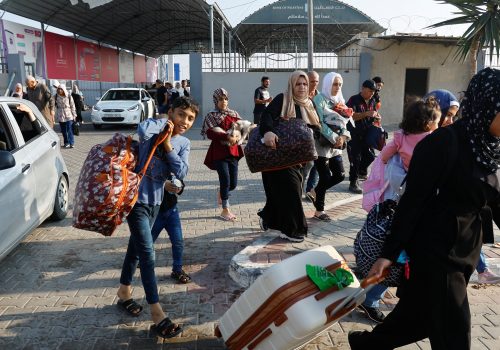The Israeli right-wing is determined to prevent any discussion of a future Palestinian state
A billboard titled “Palestinian Authority is Hamas,” appeared in Tel-Aviv, Nof HaGalil, and other Israeli cities in mid-November. It displayed an image of Palestinian Authority (PA) Chairman Mahmoud Abbas donning a green Hamas headband. According to the Uri Israel movement—a right-wing group whose declared goal is the dismantling of the PA—the billboard was meant to protest against the idea of bringing the PA back to the Gaza Strip in the aftermath of Israel’s war against Hamas.
This movement was registered at the beginning of October in the aftermath of the October 7 terrorist attack and is connected to former Knesset Member Avichai Boaron of the Likud party and some activists in pro-settlement and extreme right-wing movements. Not surprisingly, its content on social media is liked and shared by prominent Likud activists, such as Orly Lev, one of Prime Minister Benjamin Netanyahu’s staunch supporters.
Uri Israel is not the only right-wing movement that speaks and acts against the PA and warns about the possible menace of its return to the Gaza Strip.
“I have investigated terrorists, and I say clearly, money drives terrorism! It is forbidden to transfer money to the Palestinian Authority,” said Lieutenant Colonel Attorney Maurice Hirsch, former head of the military prosecution in the West Bank, on November 6.
On the same day when the anti-Abbas campaign was launched by Uri Israel, Prime Minister Netanyahu made a statement about the leader of the PA, too. Responding to the announcement of the PA Foreign Ministry that alleged the Israel Defense Forces (IDF) had killed the partygoers at the Nova music festival in Re’im on October 7, Netanyahu said on November 19: “He who denies the Holocaust denies the massacre. We will not allow him to rule Gaza.”
It seems that Netanyahu was also indirectly responding to the earlier statement of US President Joe Biden, who argued in a Washington Post op-ed on November 18 that the Palestinian Authority should ultimately govern the Gaza Strip and the West Bank following the Israel-Hamas war.
Two-state solution?
A year ago, Netanyahu established a political alliance and formed a government with the most ultra right-wing political forces in Israel, including the Likud, which believes that a two-state solution is a doomsday scenario that should be prevented at any cost. Tellingly, Netanyahu objects to the PA ruling Gaza due to Abbas’s denial of the Holocaust and the PA’s denial of the October 7 massacre. However, he also believes the same PA should continue functioning in the West Bank.
In his remarks at the Foreign Affairs and Security Committee at the Knesset this summer, Netanyahu referred to the future of the PA as a day after the era of 88-year-old Abbas: “We need the Palestinian Authority, we will help it financially—we have no interest in it falling.” Netanyahu also said that “the Palestinian aspiration for a state must be suppressed.”
In fact, this logic was always a significant part of “the conception”—that the PA should exist so that it will be able to govern the Palestinians in the West Bank but also remain weak so that it will be unable to fulfill any state-related ambitions. That’s why Hamas in Gaza was so instrumental in achieving this goal—it was a tactical ally in Netanyahu’s war against the PA.
On October 7, when Hamas terrorists crushed the fence and poured into Israeli towns and kibbutzim, slaughtered over 1,200, and kidnapped over 240 Israelis and foreigners, it became clear that this long-term strategy had exploded in Israel’s face and resulted in the most horrific terrorist attack and loss of human lives in Israel’s history.
At that moment, when the heads of all security services, as well as some Likud ministers, assumed responsibility for the disaster, and the official death of the “conception” was proclaimed in Israeli media, it seemed that it was time to reinvent the original idea of the two-state solution: Palestinian self-rule in both the Gaza Strip and West Bank; the construction of state institutions; negotiations; and an eventual political solution that would result in the establishment of a Palestinian state.
On October 19, Tzachi Hanegbi, Israel’s national security advisor, suggested that the Palestinian Authority will step in instead of Hamas in Gaza. A two-state solution or the creation of a Palestinian state wasn’t mentioned. Yet, Hanegbi was immediately attacked by Likud MKs; Tally Gotlib was one among them, writing on X (formerly known as Twitter) that Hanegbi’s idea was “delusional” before sending her condolences to those who believed that strengthening the PA would prevent terrorist attacks. Separately, Israeli Finance Minister Bezalel Smotrich, who represents an extreme right-wing party, said that installing Abbas in Gaza instead of Hamas was like “changing a cow for a donkey,” whatever that might mean.
The other side of the political map wasn’t thrilled about Abbas’s return to Gaza either but seemed to consider it the lesser evil to the continuation of Hamas rule or a security vacuum.
“Unfortunately, Abu Mazen [nickname for Abbas] is a well-known Holocaust denier, the Palestinian Authority’s statement denying the massacre on October 7 is a scoundrel, and the transfer of funds from the Palestinian Authority to the families of martyrs infuriates anyone with a heart. And, yet, the Palestinian Authority is better than the murderous Hamas, and if we could get it back into the Gaza Strip, we would do it. Between the lesser evil and the greater evil, the lesser evil is better,” former deputy chief of staff and ex-member of Knesset Yair Golan wrote on X.
What’s next?
Weeks have passed since the horrific tragedy that shook every Israeli and led to the war against Hamas, which used to be considered a “strategic asset” in an attempt to prevent the creation of the Palestinian state. Currently, Netanyahu and the right-wing are back to their smear campaign against the PA and essentially back to the “conception” that any evil is better than the prospect of a Palestinian state.
Benny Gantz, the former defense minister in the Yair Lapid and Naftali Bennett government—who is now rising quickly in the polls and is considered a possible candidate to replace Netanyahu—is now part of the emergency government and is mostly keeping quiet in an attempt not to jeopardize his chances of premiership. In 2021, Gantz met PA Chairman Abbas in his house in Rosh HaAyin to explore “political horizons”—something many Israelis saw at the time as his readiness to negotiate with and accept the PA.
Now, it seems that the Israeli government intentionally chooses to delay the inevitable discussion about the day after in Gaza, which, given the international pressure, might come sooner than Israeli officials hope. Netanyahu still hopes to safeguard his political future; the extremists around him believe that the war in Gaza presents them with a unique opportunity to get rid of not only Hamas but Palestinians, too (Gila Gamliel, the minister of intelligence who doesn’t have any authority over any of the intelligence services, had penned an article in the Jerusalem Post about the possible “exodus” of Palestinians from Gaza). Meanwhile, more moderate Likud seniors, such as Nir Barkat, keep to themselves, fearing the notorious “poison machine” of Netanyahu’s loyalists.
According to a November survey conducted by Mitvim Institute for Regional Foreign Policies, 27 percent of the Israeli public supports the two-state solution. In comparison, 25 percent believe that Israel should opt for unilateral disengagement from the West Bank. Only 5 percent believe in the continuation of “conflict management” (Netanyahu’s strategy), while 28 percent support some form of annexation (19 percent of respondents didn’t have an answer), and 52 percent believe that Israel should disengage from the Palestinians, whether that be through some kind of agreement or unilaterally (in the way it was done in the Gaza Strip in 2005).
With that in mind, several things need to happen very soon so that the Gaza Strip, West Bank, and Israel have a chance for peace and stability: elections in Israel, reforms in the Palestinian Authority, and a firm international position that puts the two-state solution on the table. Otherwise, the vacuum in Gaza will quickly fill with Hamas 2.0, the weak PA might collapse in the West Bank, and Israel will be trapped in an endless circle of hostilities in many of its frontiers. The “day after” discussion should start today before it’s too late.
Ksenia Svetlova is a nonresident senior fellow with the Atlantic Council’s Middle East Programs, and is the director of the Israel-Middle East Relations Program at Mitvim. Follow her on X: @KseniaSvetlova.
Further reading
Mon, Oct 23, 2023
The Gaza war will be the final straw for Netanyahu’s long political career
MENASource By Ksenia Svetlova
Despite the public anger and the frequent calls for him to resign, Prime Minister Benjamin Netanyahu is still busy with petty politics.
Fri, Oct 27, 2023
A humanitarian corridor in the Israeli Negev could save Gazans
MENASource By
There is no perfect solution to alleviate the death and destruction that awaits in the Gaza Strip, but getting women, children, and the elderly out of harm’s way would be a positive step.
Fri, Nov 3, 2023
As the Gaza war continues, Egypt is facing pressure to act
MENASource By Shahira Amin
As Israel expands its ground raids in the Gaza Strip, Egypt is witnessing the ripple effects of the war and faces growing pressure to act in regard to Palestinian refugees.
Image: Palestinian President Mahmoud Abbas, right meets with U.S. Secretary of State Antony Blinken at his office in Ramallah, in the Israeli-occupied West Bank, Thursday, Nov. 30, 2023. Nasser Nasser/Pool via REUTERS


